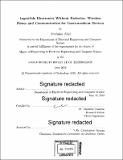Ingestible electronics without batteries : power and communication for gastroresident devices
Author(s)
Abid, Abubakar
DownloadFull printable version (10.60Mb)
Alternative title
Power and communication for gastroresident devices
Other Contributors
Massachusetts Institute of Technology. Department of Electrical Engineering and Computer Science.
Advisor
Giovanni Traverso.
Terms of use
Metadata
Show full item recordAbstract
In this thesis, I introduce a novel ingestible electronic device designed to reside inside the stomach for weeks or longer with both wireless communication and wireless powering capabilities. The device is powered by a transmitter outside of the body via wireless power transfer through 5 to 6 cm of tissue, while keeping under specific absorption of radiation limits. Electromagnetic theory and microwave simulations identified the optimal region of operation for transmitting power through tissue as around 1 GHz. Small loop antennas fabricated to fit onto a circuit board the size of a pill capsule exhibited power transfer efficiencies of around -45 dB when tested ex vivo in pig stomach tissue. Choice of electronic components for rectification, sensing, and wireless communication are also discussed, as well as electrical and material characterization of an encapsulated device, to show that an end-to-end wireless ingestible electronic device is feasible for gastroresident applications.
Description
Thesis: M. Eng., Massachusetts Institute of Technology, Department of Electrical Engineering and Computer Science, 2016. Cataloged from PDF version of thesis. Includes bibliographical references (pages 77-80).
Date issued
2016Department
Massachusetts Institute of Technology. Department of Electrical Engineering and Computer SciencePublisher
Massachusetts Institute of Technology
Keywords
Electrical Engineering and Computer Science.